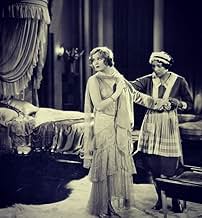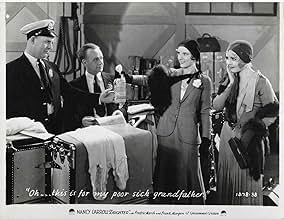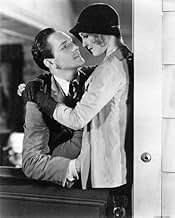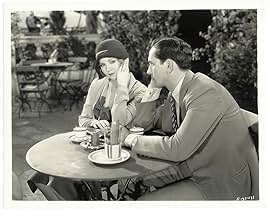Ajouter une intrigue dans votre langueA former chorus girl weds a millionaire after the composer she loves leaves. Meanwhile, she strings along an artist in love with her. When the composer returns, she struggles with her needs ... Tout lireA former chorus girl weds a millionaire after the composer she loves leaves. Meanwhile, she strings along an artist in love with her. When the composer returns, she struggles with her needs for security vs love. High jinks and drama ensue.A former chorus girl weds a millionaire after the composer she loves leaves. Meanwhile, she strings along an artist in love with her. When the composer returns, she struggles with her needs for security vs love. High jinks and drama ensue.
- Réalisation
- Scénario
- Casting principal
- Nommé pour 1 Oscar
- 3 victoires et 1 nomination au total
Eric Blore
- Party Guest in Angel Costume
- (non crédité)
Charles Halton
- Winslow - Gibson's Secretary
- (non crédité)
Duncan Penwarden
- Mr. Miller
- (non crédité)
Avis à la une
... or make a wise decision concerning your future for that matter. The life of ex-chorus girl Peggy (Nancy Carroll) now socialite wife to public utilities king C. Morton Gibson (Frank Morgan) seems to be an object lesson in this fact. Peggy is already a millionaire's wife by the time the film opens, so we don't see any of her past life, just the human remnants of it. First there's Ralph, an overwrought starving artist who is obsessed with memories of Peggy but whom Peggy never apparently loved. Next there's Paul Lockridge (Fredric March), starving musician, whom Peggy did love but was overseas at the time she made the decision to marry Gibson, and thus could not plead his case.
Peggy doesn't have to worry about being hungry anymore, in fact she doesn't have to worry about anything in her new life. However, her husband treats her like a cross between a bird in a gilded cage and a welfare case, always talking about her "unfortunate past" and scrutinizing her every unexplained absence. Neither is he a particularly passionate fellow - accumulating more and more cash is his real passion. The lack of joy in Peggy's life comes to the surface when Paul returns from Europe to win her back. His only asset - laughter, the joy of life lived experience by experience. Add to this a chance meeting of Peggy's unstable old suitor, Ralph, with Peggy's new stepdaughter, Marjorie, that turns romantic and complications abound.
This is a rather understated film, nothing is particularly laugh-out-loud funny or horribly suspenseful and melodramatic save for a couple of short scenes in each case. Thus the film's success largely rests on the acting of the performers, which is quite good. Since this film was made in 1930, many might think it is about the desperate decisions and trade-offs people had to make to keep eating during those times, but it really predates the depression.
This is a good one for fans of Nancy Carroll, who plays her understated role very well - that of a decent woman whose profession of chorus girl guarantees not only that she has just a few good years to make a decision on the only profession that could come afterwards for such women in the 1920's - marrying well, but that everyone automatically doubts her character because of her profession.
Peggy doesn't have to worry about being hungry anymore, in fact she doesn't have to worry about anything in her new life. However, her husband treats her like a cross between a bird in a gilded cage and a welfare case, always talking about her "unfortunate past" and scrutinizing her every unexplained absence. Neither is he a particularly passionate fellow - accumulating more and more cash is his real passion. The lack of joy in Peggy's life comes to the surface when Paul returns from Europe to win her back. His only asset - laughter, the joy of life lived experience by experience. Add to this a chance meeting of Peggy's unstable old suitor, Ralph, with Peggy's new stepdaughter, Marjorie, that turns romantic and complications abound.
This is a rather understated film, nothing is particularly laugh-out-loud funny or horribly suspenseful and melodramatic save for a couple of short scenes in each case. Thus the film's success largely rests on the acting of the performers, which is quite good. Since this film was made in 1930, many might think it is about the desperate decisions and trade-offs people had to make to keep eating during those times, but it really predates the depression.
This is a good one for fans of Nancy Carroll, who plays her understated role very well - that of a decent woman whose profession of chorus girl guarantees not only that she has just a few good years to make a decision on the only profession that could come afterwards for such women in the 1920's - marrying well, but that everyone automatically doubts her character because of her profession.
Harry D'Abbadie d'Arrast doesn't hang about with this tale of rags to riches that has loads of emotional baggage thrown in for good measure. "Peggy" (Nancy Carroll) is let down by her true love and takes the easy option by marrying the dull and staid millionaire "Gibson" (Frank Morgan) who guarantees her an easy, if uninteresting life. She's too restless a spirit for all of that, and although she resists the advances of the boyish and unstable sculptor "Ralph" (Glenn Anders) she is ready to jump ship when the carefree "Lockridge" (Fredric March) re-emerges into her life with a plan for her to escape her silk-clad drudgery and head for la Vie Parisienne - via some high jinx and a bit of burglary. Tempted, her life is thrown into turmoil by the daughter of her husband, "Marjorie" (Diane Ellis) who has a few designs of her own! This tries hard to straddle a few genres here, and whilst the dramatic aspects work well enough, the comedic ones prove a little beyond everyone to convincingly pull off. As the story progresses, even the usually reliable Morgan looks a little uncomfortable with the increasingly contrived nature of the plot within a plot within a plot. Also, by the end I'd rather concluded that "Peggy" was no great shakes as an human being either. The production could fairly be described as embryonic and the photography seemed framed at times as if to allow the actors to read cue cards off-set the cameras - that looked a bit squinty. Still, it's all quite light-hearted and enjoyably enough paced to pass ninety minutes effortlessly.
Ha ha. Nice line from Fredric March (Paul) who plays a musician who is in love with chorus girl Nancy Carroll (Peggy). However, she has married wealthy bore Frank Morgan (Mr Gibson). She has wealth but no laughter in her life which is what March returns to see her about. But there is also someone else on the scene - artist Glenn Anders (Ralph). This side of the story is pretty heavy-going and throws in some real drama to the proceedings.
The side story with Anders takes you down a route that you don't expect in a comedy but it has pivotal significance for the character of Nancy. The acting is good from all and March and Carroll have a good chemistry and carefree attitude which comes across well. There are several funny scenes, eg, when the two lovebirds break into a stranger's house, the piano sequence with March and the butler Leonard Carey and the spontaneous dancing from Carroll and Morgan's daughter Diane Ellis (Marjorie) to name a few. This was to be the last film made by Ellis who died at age 20 whilst on honeymoon in India.
Finally, I can't wait to start calling people from Hell.
The side story with Anders takes you down a route that you don't expect in a comedy but it has pivotal significance for the character of Nancy. The acting is good from all and March and Carroll have a good chemistry and carefree attitude which comes across well. There are several funny scenes, eg, when the two lovebirds break into a stranger's house, the piano sequence with March and the butler Leonard Carey and the spontaneous dancing from Carroll and Morgan's daughter Diane Ellis (Marjorie) to name a few. This was to be the last film made by Ellis who died at age 20 whilst on honeymoon in India.
Finally, I can't wait to start calling people from Hell.
Harry D'Abbadie D'Arrast always complained that this movie, which he considered his best, was undeservedly forgotten, for it created many concepts which would reappear in comedies of later years.
This time he was right. It is surprising to find in such an early film the conflict between economical safeness and spiritual freedom that would later be typical of such wonderful films as Frank Capra's You Can't Take It with You, and very especially, George Cukor's Holiday (not a surprising coincidence, since it was written by the same screenwriter as Laughter).
It is an answer to the existentialism dilemma, where the only choices to make are living for the future (marrying a millionaire) or for the present (enjoying the moment you're currently living). Laughter goes even further than the later films, for it incorporates a third answer: suicide, which takes the story for the path of melodrama with a surprising respect of its unity.
In fact, what is most curious about Laughter is that it is much more mature that one would suspect. The structure of the story, the performances and even the humor feels fresher than those of other comedies of the period. A good example is the surprising scene in which Fredric March and Nancy Carroll do some role playing just for the sake of it: they pretend to be a marriage in which he is the woman and she is the man. They both imitate the conventions of each sex's supposedly proper behavior, making fun of predetermined attitudes and social obligations, clearly defending sponaneity and freedom as opposed to that which they parody/criticize (social roles conditioned by sexes).
Also the way the structure of the story is inventive enough, with a past time we never see but which is reflected in the present, and a triggering opening which serves as the conclusion of the movie as well. In fact, many other the elements of the movie (starting by the title itself) are developed in more than one level, like this one.
The biggest fault of the film is not in its final quarter (which, contrary to what I had read, seems to me fluid and coherent with the rest of the film): it is a number of technical limitations, which harm its rhythm for today's audience. These were common in the beginning of sound film (Lubitsch somehow avoided most of them in The Love Parade, made one year before this and quite a miracle).
The shortcoming I found most annoying was the impossibility for the camera to show the characters in a more frontal angle than the profiles during dialogs, which gives some important scenes a very old fashioned stagy feel.
(It had to do with the sound equipment: for what I know, they couldn't edit the sound they recorded, so they had to film each scene with several cameras so that they could use full takes of sound. So there could only be one light setup, and therefore, the characters had to be filmed from the only side where the light was better).
However, compared with most movies of that period, Laughter is a clear winner, and it is no wonder that March considered it one of his best films. His performance is relaxed, joyful and attractive still today, and so is Nancy Carroll's.
It is a pity that D'Arrast is not better known today, nor this movie properly restored/distributed. It is a interesting work on many levels, by a highly original and innovative filmmaker.
This time he was right. It is surprising to find in such an early film the conflict between economical safeness and spiritual freedom that would later be typical of such wonderful films as Frank Capra's You Can't Take It with You, and very especially, George Cukor's Holiday (not a surprising coincidence, since it was written by the same screenwriter as Laughter).
It is an answer to the existentialism dilemma, where the only choices to make are living for the future (marrying a millionaire) or for the present (enjoying the moment you're currently living). Laughter goes even further than the later films, for it incorporates a third answer: suicide, which takes the story for the path of melodrama with a surprising respect of its unity.
In fact, what is most curious about Laughter is that it is much more mature that one would suspect. The structure of the story, the performances and even the humor feels fresher than those of other comedies of the period. A good example is the surprising scene in which Fredric March and Nancy Carroll do some role playing just for the sake of it: they pretend to be a marriage in which he is the woman and she is the man. They both imitate the conventions of each sex's supposedly proper behavior, making fun of predetermined attitudes and social obligations, clearly defending sponaneity and freedom as opposed to that which they parody/criticize (social roles conditioned by sexes).
Also the way the structure of the story is inventive enough, with a past time we never see but which is reflected in the present, and a triggering opening which serves as the conclusion of the movie as well. In fact, many other the elements of the movie (starting by the title itself) are developed in more than one level, like this one.
The biggest fault of the film is not in its final quarter (which, contrary to what I had read, seems to me fluid and coherent with the rest of the film): it is a number of technical limitations, which harm its rhythm for today's audience. These were common in the beginning of sound film (Lubitsch somehow avoided most of them in The Love Parade, made one year before this and quite a miracle).
The shortcoming I found most annoying was the impossibility for the camera to show the characters in a more frontal angle than the profiles during dialogs, which gives some important scenes a very old fashioned stagy feel.
(It had to do with the sound equipment: for what I know, they couldn't edit the sound they recorded, so they had to film each scene with several cameras so that they could use full takes of sound. So there could only be one light setup, and therefore, the characters had to be filmed from the only side where the light was better).
However, compared with most movies of that period, Laughter is a clear winner, and it is no wonder that March considered it one of his best films. His performance is relaxed, joyful and attractive still today, and so is Nancy Carroll's.
It is a pity that D'Arrast is not better known today, nor this movie properly restored/distributed. It is a interesting work on many levels, by a highly original and innovative filmmaker.
I watched LAUGHTER, a 1930 film starring Nancy Carroll and Fredric March. Many comments and reviews state this film as a forerunner of the 30s screwball comedy. Yes there were some screwball elements, such as the silly sequence when the stars, caught in the rain, break into a house and put on bear rugs while their clothes dry. There's also a terrific scene when March is playing piano when the butler (Leonard Carey) tries to correct him. They end up playing duets! There's also a nice party scene where Eric Blore shows up in an angel costume. Another standout scene is when the daughter (Diane Ellis) starts to jazz dance and is joined by Carroll while Frank Morgan sourly looks on. Also of interest is Pearl the maid, played by Ollie Burgoyne, who was better known as Olga Burgoyne, a dancer in many stage shows.
Still, I don't see this film as a comedy, let alone a screwball comedy. Carroll (she's very good) plays a former show girl who marries Morgan for his money. His daughter is only a little younger than Carroll. The daughter is a little wild; Carroll is a lot bored. She has everything in her life but "laughter." When she takes up with March, we know the marriage is doomed. So does everyone else.
Morgan's character hasn't an ounce of humor in him. There's also a tragic starving artist type (Glenn Anders) who gets involved with Ellis. It's with this character that any shred of comedy drains from the picture as doom settles over the storyline.
This is still a very good film with solid work from its stars.
Still, I don't see this film as a comedy, let alone a screwball comedy. Carroll (she's very good) plays a former show girl who marries Morgan for his money. His daughter is only a little younger than Carroll. The daughter is a little wild; Carroll is a lot bored. She has everything in her life but "laughter." When she takes up with March, we know the marriage is doomed. So does everyone else.
Morgan's character hasn't an ounce of humor in him. There's also a tragic starving artist type (Glenn Anders) who gets involved with Ellis. It's with this character that any shred of comedy drains from the picture as doom settles over the storyline.
This is still a very good film with solid work from its stars.
Le saviez-vous
- AnecdotesOrson Welles cast scene-stealing character-actor Glenn Anders in The Lady From Shanghai because he had remembered how good he was in this film.
- ConnexionsAlternate-language version of A Mulher Que Ri (1931)
- Bandes originalesLittle Did I Know
by Irving Kahal, Pierre Norman and Sammy Fain
Meilleurs choix
Connectez-vous pour évaluer et suivre la liste de favoris afin de recevoir des recommandations personnalisées
Détails
- Date de sortie
- Pays d’origine
- Langue
- Aussi connu sous le nom de
- Falsa personalidad
- Lieux de tournage
- Société de production
- Voir plus de crédits d'entreprise sur IMDbPro
- Durée1 heure 25 minutes
- Couleur
- Rapport de forme
- 1.20 : 1
Contribuer à cette page
Suggérer une modification ou ajouter du contenu manquant































